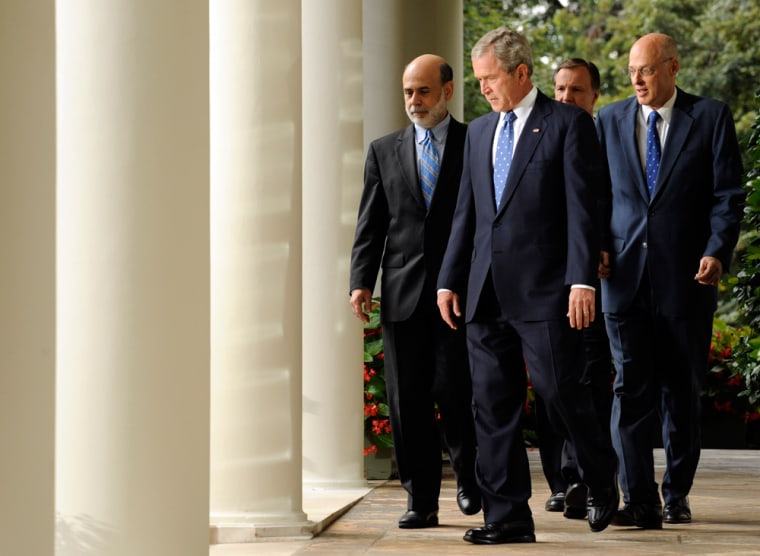President Bush on Friday asked Congress to approve extensive federal intervention in financial markets that he said is both warranted and essential to halt the worst financial crisis in decades. “We must act now,” he said.
“America’s economy is facing unprecedented challenges. We’re responding with unprecedented measures,” Bush declared, standing in the White House Rose Garden with Treasury Secretary Henry Paulson, Federal Reserve Chairman Ben Bernanke and Christopher Cox, chairman of the Securities and Exchange Commission.
Shortly after his remarks, Bush called congressional leaders with whom the administration would be negotiating through the weekend to devise a rescue package. He spoke to Senate Majority Leader Harry Reid, D-Nev., House Speaker Nancy Pelosi, D-Calif., and Senate Republican leader Mitch McConnell. He planned to reach House Republican leader John Boehner later in the day.
The administration wants to see a package emerge from the weekend, to lend calm to Monday morning’s market openings, said Keith Hennessey, the director of the president’s economic council. The goal is to have something passed by Congress by the end of next week, when lawmakers recess for the elections.
“This is a pivotal moment for America’s economy,” Bush said in his most extensive remarks this week on the crisis. He said that a financial contagion that began with low-quality home mortgages had “spread throughout our financial system” and frozen many financial transactions.
The president said the federal government should interfere in the marketplace “only when necessary,” and that this is one of those times. “Given the precarious state of today’s financial markets, and their vital importance to the daily lives of the American people, government intervention is not only warranted, it is essential,” he said.
Hennessey said fears that there was going to be a run on money market funds was one but not the only reason that drove the administration to make the proposal to Congress.
Bush said the authorities the administration wants Congress to approve — which Paulson said earlier Friday could entail “hundreds of billions” of dollars — was not without risk. But he said that because “the vast majority of assets the government is planning to purchase have good value over time” he expects the money to be paid back to the federal government.
Even if it isn’t, he said “the risk of not acting would be far higher.”
Bush spoke in unusually stark terms about the problems facing the economy and the dangers of not acting, which he attempted to frame in terms relevant not just to Wall Street, but to ordinary Americans, too.
He said “the gears of our financial system ... were at risk of grinding to a halt.” If this were allowed to happen, the president predicted it would “cause massive job losses, devastate retirement accounts and further erode housing values, as well as dry up loans for new homes and cars and college tuitions.”
The president also appeared to go out of his way to reassure Americans that money in traditional checking accounts, savings accounts and certificates of deposit is safe.
“Every American should know that the federal government continues to enforce laws and regulations protecting your money,” he said.
He noted that, through the Federal Deposit Insurance Company, “every savings account, checking account and certificate of deposit is insured by the federal government for up to $100,000. The FDIC has been in existence for 75 years, and no one has ever lost a penny on an insured deposit, and this will not change.”
“We have a flexible and resilient system that absorbs challenges and makes corrections and bounces back,” Bush said. “ ... Our economy has weathered every one of these challenges and still managed to grow. We will weather this challenge, too, and we must do so together.”
He warned Democratic leaders against adding “controversial provisions” to the rescue package “that could delay action.” White House press secretary Dana Perino would not comment on what sorts of provisions would be considered unacceptable to the president, and Hennessey said there would be room for negotiation with lawmakers on how the package would look.
“This is not a time for partisanship,” Bush said.
He spoke after the administration said it would safeguard assets in money market mutual funds and temporarily banned short-selling of financial company stocks, a trading technique that bets on stocks declining in value. The Treasury Department has asked Congress to give it sweeping power to buy up toxic debt that has nearly paralyzed Wall Street.
Bush also has authorized Treasury to tap up to $50 billion from a Depression-era fund to insure the holdings of eligible money market mutual funds. And the Federal Reserve announced it will expand its emergency lending program to help support the $2 trillion in assets of the funds.
